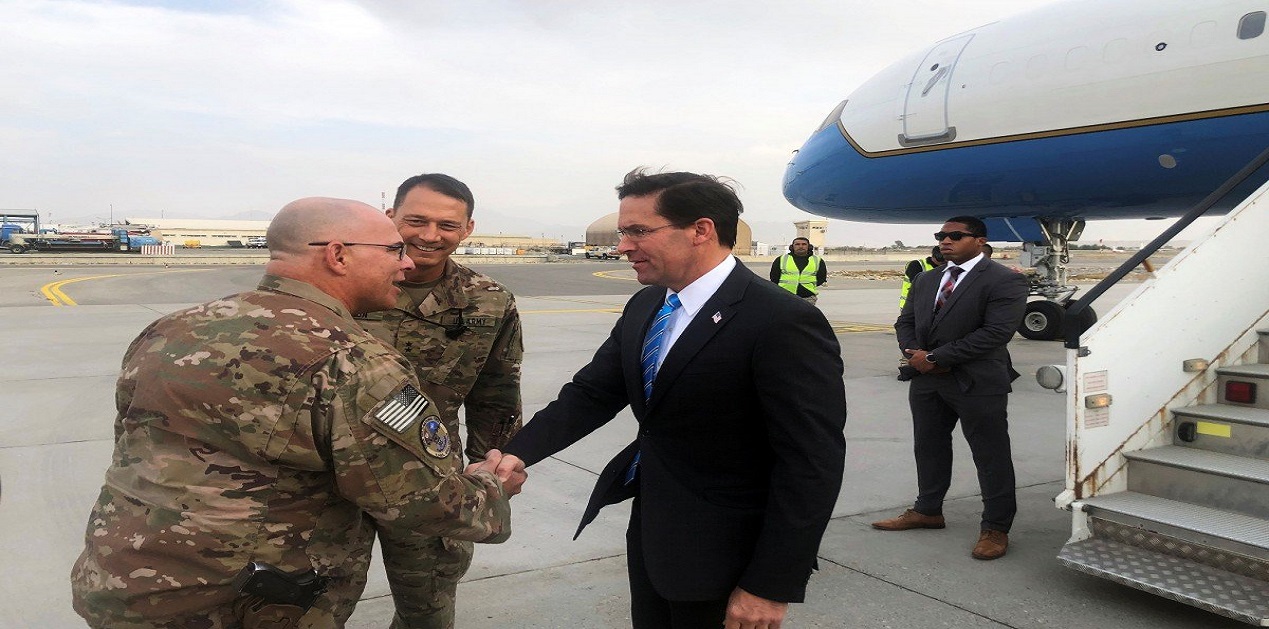Dr. Mark T. Espar, US Defence Secretary has in a telephonic conversation with Pakistani Army chief, Qamar Javed Bajwa on 19th March, 2020 reaffirmed his country`s long-term mutually beneficial security partnership with government of Pakistan inter-alia conveying appreciation for Pakistan`s support to the Afghan reconciliation process. The significance of this statement cannot be overstated. The import of the reiteration of this partnership has to be judged in the context of expectations the Trump administration has from Pakistan, to obtain a successful outcome of the recently concluded Agreement with Taliban on 29th February, 2020 at Doha. The outcome to be achieved through this Agreement is substantial, including release of 6000 prisoners and starting of intra-Afghan dialogue by 10th March, 2020, release of all prisoners by 10th June this year, removal of sanctions on the Taliban by 27th August, 2020 and complete de-induction US and its Allies military and other personnel by 30th April next year. Whether this so-called mutually beneficial security partnership will help achieve the desired results only time will tell.
India`s External Affairs Minister, Subramanian Jaishankar, has already expressed anxiety on the future scenario by observing that New Delhi will be watching how the gains achieved during the presidency of Hamid Karzai and Ashraf Ghani, are protected. India has provided multifaceted assistance to the governments in Kabul since the overthrow of the radical Islamist Taliban regime in December 2001, as a regional stabilizing initiative but at considerable cost. This assistance has been development oriented, and intended to promote a law and rights-based governance, accommodative of different ethnic interests in Afghanistan. However, there has been an inherent conflict between the very thrust of India’s assistance to Afghanistan and the proclivities of different Pakistani governments, and particularly of that country’s military establishment, radical Islamists and the Taliban elements sheltered there, keen to undermine the above-mentioned attributes of India`s assistance and New Delhi`s influence in Afghan affairs. In this backdrop, the statement of US Defence Secretary under reference, will not help allay India`s apprehensions for the future. A pragmatic assessment of the evolving scenario may therefore, may induce India to have doubts on whether USA could be relied upon to restrain Pakistan’s efforts in undoing the gains India has achieved in facilitating a development oriented and less radical Afghanistan, during the forthcoming conflictual transition to a new multi-stakeholder regime in Kabul.
During US President Trump’s official visit to India in February last, the evolving Afghan situation would have been discussed between the leaders of the two countries. However, no clear indication has emerged on the forward-looking approach both countries could adopt in the matter or developing congruency in their policies vis-à-vis a future Afghanistan. While a bland statement had been issued by Government of India welcoming the Doha Agreement of 29th February, 2020, there is no clarity on the extent of continuing support Washington desires from New Delhi towards consummation of the Afghan peace process.
It is not that the India factor is totally out of the reckoning in US policy as it is evolving on Afghanistan, but Washington does not seem to be according due primacy to New Delhi`s strategic concerns in the matter. If Defence Secretary Esper’s statement is any indication, the Trump administration would prefer leveraging the security partnership with Pakistan towards attaining its objectives in relation to Afghanistan, without India being factored in any crucial aspect. Thus, India should not expect any significant support from the US government in furthering its objectives on Afghanistan and protecting the gains it had achieved in that country. It may be unavoidable for Government of India to work through the bilateral relationship process with the existing Afghan leaders and also with the insurgent Taliban to the extent feasible, for a modus vivendi when a future multi-stakeholder regime is in place in Afghanistan, as envisaged by the Agreement.
The negotiations among the present Afghan leaders and political factions and the Taliban, will be a very tortuous affair. The initial phase towards prisoners’ release ending on 10th March, 2020, has already been contentious. If this process does not go through successfully, final U.S. and its Allies` military withdrawal from Afghanistan by 30th April next year, may be in jeopardy. The country is already torn between the factions led by the incumbent President, Ashraf Ghani and former Chief Executive, Abdullah Abdullah, in the recent post-presidential election period, with both claiming victory to the presidency. There is no sign of rapprochement between their political factions and supporters. In fact, US Secretary of State, Michael Pompeo had to rush to Kabul and even threaten to cut aid to the Afghan government by one billion US dollars to force a political understanding between the Ashraf Ghani and Abdullah Abdullah factions.
No unified stand among the political forces opposed to the Taliban has emerged as yet. In this scenario, it is understandable that Khalilzad and the Trump administration would like the Pakistani government and the powers that matter in that country, to nudge the Taliban to be accommodative as well themselves push Asfraf Ghani to meet the Taliban demands substantially. The web of relationship which Washington presently has with Islamabad in the security domain and beyond, are instruments which the US government would not like to forego. Government of India can be oblivious of these determinants of US-Pakistan bilateral relations, only to its peril. Defence Secretary Esper has not said anything new, but only stated the obvious.
Notwithstanding the unfolding events within Afghanistan and Defence Secretary Esper`s observations as mentioned above, the enduring of US-Pakistan strategic and security oriented relationship may not be deemed as a failure of India`s foreign policy on Afghanistan. In the shifting internal political dynamics and security scenario in Afghanistan over the past two decades, challenges before different governments in New Delhi, have been substantial. Some opportunities may have been lost in the matter of developing a sustainable triangular infrastructure development oriented relationship between Iran, Afghanistan and India, which could have thwarted Pakistani efforts in undermining or disturbing the bilateral ties between India and Afghanistan. Nonetheless, the gains in terms of goodwill of the Afghan people and their acceptance of India as a benign and friendly neighbor, is undeniable.
Government of India will have to devise a suitable course of action or response, accepting the inevitable factor of US-Pakistan security nexus. New Delhi may also endeavour towards inducing Washington to play a restricted but effective role without USA having to overtly deploy military forces to protect soft targets in Afghanistan, like places of worship and obviate attacks like the one perpetrated by ISIS elements at Kabul against the Sikh minority community on 25th of March this year. In the context of the recent Corona virus pandemic affecting a large number of Afghans who have been exiting eastern Iran and returning to the western provinces of Afghanistan, there could be a strategic opportunity for New Delhi to work out a limited cooperative framework of relations on healthcare and community welfare delivery systems involving USA and a dispensation including or dominated by the Taliban. New Delhi should adroitly leverage such opportunities keeping India`s strategic perspective in view.
The coming months will be a crucial period for India`s foreign policy towards Afghanistan. With an inevitable draw-down of US and its Allied military forces in Afghanistan over the next ten to twelve months, Pakistan because of its geo-strategic location vis-à-vis the Persian Gulf littoral as well as to Central Asia, is likely to remain a lynchpin in USA’s Central Asia and Middle East policies. India has to live with this phenomenon and make the best of the opportunities which arise.
(The paper is the author’s individual scholastic articulation. The author certifies that the article/paper is original in content, unpublished and it has not been submitted for publication/web upload elsewhere, and that the facts and figures quoted are duly referenced, as needed, and are believed to be correct). (The paper does not necessarily represent the organisational stance... More >>
Image Source: https://news.cgtn.com/news/2019-10-21/EU-calls-for-Afghan-ceasefire-as-Esper-makes-surprise-visit-to-Kabul--KXThoMK3bW/index.html











Post new comment